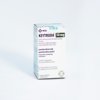Fritextsökning
Artiklar per år
Innehållstyper
-

BioArctic moves forward with its candidate for Parkinson’s
BioArctic announces positive early phase study results for its drug candidate for Parkinson’s disease.
-

MSD discontinues two Keytruda trials
MSD has stopped two late-stage trials that tested its blockbuster immunotherapy Keytruda as a treatment for skin and lung cancer.
-

Danish biotech to buy struggling American oncology company
Danish drugmaker Pharmacosmos has agreed to acquire American pharmaceutical company G1 Therapeutics in a deal that amounts to 405 million dollars.
-

Ranking: Top 10 highest-paid CEOs in pharma
It's nice to hear that things go well for others, right? Some of those who have done really well – at least financially – are listed here in the ranking of the best paid CEOs in Big Pharma 2023.
-

Setback for pharmaceutical companies in the Zantac case
A Delaware judge has ruled in favour of allowing expert witnesses to testify in a case involving the now-cancelled drug Zantac and its potential carcinogenicity.
-

Nobel Prize winner Torsten Wiesel turns 100: “Old men like me should use their experience to help the young”
In 1955, a young Torsten Wiesel jumped on a boat to the US and embarked on a fabulous career as a neuroscientist, crowned with a Nobel Prize for his work. Now 100 years old, he looks back on an intense life and his upbringing in Stockholm, Sweden, which shaped his desire to help the vulnerable in society.
-

Innovative start-up helps doctors, scientists and industry balance coagulation risks
For many doctors caring for seriously ill patients, for example, in stroke units and cancer wards, maintaining the life-saving balance between bleeding and thrombosis is an ongoing challenge. In the late 1980s, scientists at Maastricht University in the Netherlands developed an innovative method, the thrombin generation assay (TGA), which provides a complete overview of a physiological process crucial for maintaining normal haemostasis.
-

“Conducting research at universities is becoming more and more like working at a research hotel”
The government wants Swedish research to focus on excellence and innovation, but can the two be combined? Life Science Sweden talks to Anna Falk, a professor at Lund University, about research policy, the constant hunt for funding in academia and what
-

Samuel Lagercrantz: “Companies that do this successfully will take the lead”
The development of new medicines and medical technologies should not focus too narrowly on prolonging life. It is equally important to develop treatments that relieve pain or eliminate painful symptoms, writes Samuel Lagercrantz in an editorial.
-

Bayer has cut 1,500 roles – so far
German chemical and pharmaceutical group Bayer cut more than 1,500 roles in the first quarter alone– and most of them were management positions.
-

Total pipeline of pharmaceutical companies reaches a record high – 22,921 medicines are currently being developed
Despite the difficult economic times, pharmaceutical companies have never developed as many new drugs as now.
-

Carl Borrebaeck – professor and serial entrepreneur with a taste for speed
Award-winning cancer researcher, the founder of many listed companies, and constantly in the academic and commercial spotlight for decades. However, Carl Borrebaeck, Professor of Immunotechnology at Lund, is not yet satisfied. “We have a new, potentially super exciting project in the pipeline,” he says.
-

Forskaren in Hagastaden now inagurated
The real estate company Vectura's life science center in Hagastaden, Forskaren, is now inaugurated. The opening was attended by people from the industry, politicians and royalty.
-

Nocebo – the evil twin that makes you feel worse
The placebo effect is well known in healthcare, but not so its opposite: nocebo. “The effect is small, but it can have major repercussions,” says Uppsala researcher Charlotte Blease, co-author of a book on the phenomenon.
-

Assignment: Facilitate the retention of foreign researchers
A newly appointed public inquiry is to develop measures to make attracting and retaining foreign doctoral students and researchers in Sweden easier.
-

Venom from the deathstalker carries radiopharmaceuticals to the brain
In order to target cancerous brain tumours with radionuclides, the problematic blood-brain barrier must first be crossed. Life Science Sweden has visited a KI researcher who is trialling an unusual approach ‒ using scorpion venom.
-

“Life science is important on a personal level”
From the High Coast to the Government Offices. Jeanette Edblad is a native of Ångermanland, and since September last year, she has been Head and Coordinator of the Government’s Life Science Office.
-

Samuel Lagercrantz: ”Will the Swedish life science strategy be updated with precision?”
What will the Swedish government focus on in the life science strategy that is being updated? And what should be prioritized in the strategy? Life Science Sweden's editor-in-chief Samuel Lagercrantz highlights three areas.
-

“What is important is to create an overview and understanding from different perspectives”
Scientist Jochen Schwenk analyses blood proteins using proteomics to improve our understanding of disease and health. This year, he is moderating the Lab & Diagnostics of the Future event.
-

From Valneva to the CEO position at NorthX – “I saw it as a great opportunity”
A new cell therapy for leukaemia, a vaccine in tablet form against cholera, and a proprietary mRNA line with the potential capacity to supply the entire Nordic region with vaccines during a future pandemic. These are some of the projects underway at NorthX Biologics – under the direction of new CEO Janet Hoogstraate.
-

“Don’t postpone the transition to IVDR”
Operators who have not yet started to adapt to the requirements of the new EU IVDR regulation are running out of excuses. This is the opinion of Helena Dzojic, Head of Unit at the Swedish Medical Products Agency, who continues to persistently spread her message: don’t postpone the transition.
-

To build trust, one must be able to say “I don’t know” – whether human or AI
Will AI strengthen or break down trust? It depends on whether we can understand and accept its limitations, and our own, writes Sarah Lidé in a column.
-

KI’s new super machine measures brain activity in real-time – “A very expensive hairdo”
Using brand-new, super-advanced equipment, researchers at Karolinska Institutet can now measure brain activity in real-time, with higher resolution than previously possible. “This opens up fantastic opportunities”, says brain researcher Daniel Lundqvist.
-

Rising interest in CRISPR treatments
Treatments using CRISPR technology are emerging as one of the hottest medical trends in the United States – and the FDA is doing its best to promote the development.